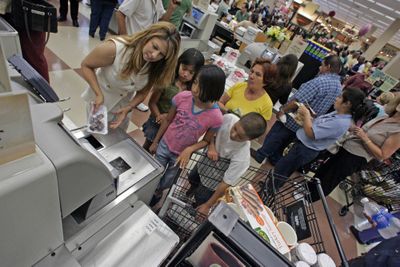Supermarket scanners could help block sale of tainted food

SACRAMENTO, Calif. – With more food recalls happening weekly, consumer advocates, supermarket chains and legislators are exploring better ways to stop the sale of tainted food, and one plan under discussion by California lawmakers involves using supermarket checkout scanners.
Programming supermarket computers to trigger an alert every time a recalled product is scanned at the checkout counter could be an easy way to help protect shoppers from buying and eating tainted foods, consumer groups say.
A system of automatic warnings, they say, would help ensure that food, such as the more than 2,600 recently recalled brands of ice cream, cake mixes, snacks and other items possibly laced with salmonella bacteria, are stopped at the point of purchase.
“Once an item has made it out of the plant, off the truck and onto the shelves and is recalled, it is unreasonable to think an individual stocker can go through every shelf and identify every item that could pose a threat,” Democratic California state Sen. Dean Florez said. “Grocers have the tools at their disposal to give consumers the final line of defense they need and expect.”
Florez, who has made food safety a top issue, recently introduced legislation that would give supermarket scanners an important role in recall efforts.
Some consumers, especially those with young children, say they like the idea of putting an extra buffer between their families and dangerous food products.
“As a mother, it’s really upsetting to think I could be buying products that are tainted and dangerous to my children,” said Fiona Hutton of Los Angeles, a working parent with two young children. “This sounds like something that could be a common-sense solution.”
Although the California Grocers Association is taking a wait-and-see stance on the proposal, some major retailers are exploring the idea themselves. Cincinnati-based Kroger Co., which operates 260 Ralphs and 118 Food for Less stores in California, has programmed its computers to issue a “hard halt” to any transaction involving a recalled product.
“Our register would not allow us to sell it to you,” Ralphs spokeswoman Kendra Doyel said.
Ralphs also uses its so-called loyalty-reward cards, which track a holder’s purchases, to warn participating customers via a notice on their sales receipt that they might have recalled and possibly dangerous foods sitting in their pantries.
About half of all food retailers have access to detailed customer data from loyalty-card programs, said Bill Greer, a spokesman for the Food Marketing Institute, an Arlington, Va., trade group that accounts for three-quarters of the industry.
Costco Wholesale Corp. tentatively supports the checkout alert system and “anything we can do to protect the consumer,” said Craig Wilson, assistant vice president for food safety and quality assurance of the Issaquah, Wash.-based warehouse chain.
For the past decade, Costco has been using information from shoppers’ membership cards to contact customers by mail and by telephone about recalled products they bought in previous months, Wilson said.
Costco said it placed 1.5 million to 2 million automated calls to alert customers who bought products that were part of the continuing recall of food containing peanuts processed by Peanut Corp. of America.
The Jan. 13 recall covers products containing peanut butter, peanut paste and peanut granules processed by Peanut Corp.’s plant in Blakely, Ga., since July 1.
Peanut Corp.’s products are used by hundreds of food manufacturers in both retail brands and bulk products sold to institutional consumers.
An inspection by the Food and Drug Administration found salmonella present in the plant. The outbreak, first identified in September, has been linked to at least nine deaths and more than 600 illnesses.
Since then, the federal government has launched a criminal investigation of Peanut Corp., and the company subsequently filed for Chapter 7 bankruptcy, which involves a liquidation of assets.
That such a massive outpouring of tainted foods could make it all the way up the supply chain and into consumers’ stomachs is evidence that the federal government’s inspection program is “completely broken,” said Elisa Odabashian, West Coast director for Consumers Union, the nonprofit publisher of Consumer Reports magazine, and that a last line of protection is needed at the supermarket checkout counter.
“There are tons of products out there still being sold in stores,” Odabashian said. “Most Americans, while they know about the salmonella outbreak, don’t have a clue about what kinds of products are involved.”
The fact that some supermarkets are snagging recalled products that hadn’t been cleared off shelves is proof that adding a new level of consumer protection is not impossible, Florez said.
“If supermarkets can get the price right with a scanner, then they certainly can identify recalled products,” he said.